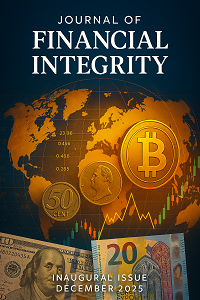
Aim
The Journal of Financial Integrity aims to advance rigorous research, policy dialogue, and practical insights that strengthen the integrity of financial systems globally. The journal seeks to contribute to the effective prevention of money laundering, terrorism financing, and other financial crimes while promoting ethical, transparent, and resilient financial markets.
Scope
The Journal of Financial Integrity publishes research on money laundering, terrorism financing, and related financial crimes, promoting transparency and resilience in financial systems. It covers topics like AML frameworks, regulatory compliance, KYC practices, and technology advancements. Contributions from academics, policymakers, regulators, practitioners, and technology experts are welcome to bridge the gap between research and implementation.
Vision
To be the leading global forum for advancing knowledge and policy solutions that strengthen financial integrity and resilience against illicit financial flows.
Mission
The Journal of Financial Integrity seeks to advance impactful research and practical insights that strengthen the global fight against money laundering, terrorism financing, and related financial crimes. By bridging academic research, policy analysis, and regulatory practices, the journal aims to foster a transparent, ethical, and resilient financial system, equipping stakeholders with knowledge to address evolving challenges in financial integrity.
Core Values
Integrity: Upholding the highest ethical standards in editorial and review processes.
Excellence: Commitment to rigorous, impactful, and evidence-based scholarship.
Collaboration: Fostering dialogue among academia, regulators, and industry practitioners.
Innovation: Embracing new methodologies and technologies to combat financial crime.
Global Perspective: Addressing diverse challenges and solutions across jurisdictions to support financial system resilience.
Sections
- Illicit Financial Flows and Economic Impacts
- AML/CFT Frameworks and Regulatory Approaches
- Technological Innovations in AML/CFT
- KYC, CDD, and Beneficial Ownership Transparency
- Trade-Based Money Laundering and Cross-Border Crime
- Terrorism Financing and Proliferation Financing
- Sanctions Compliance and Enforcement
- Financial Inclusion and Integrity Balance
- Case Studies and Jurisdictional Comparisons
- Legal and Judicial Perspectives on Financial Crime
- Open Banking and Fraud Prevention
- Cryptocurrencies, Blockchain, and Financial Crime